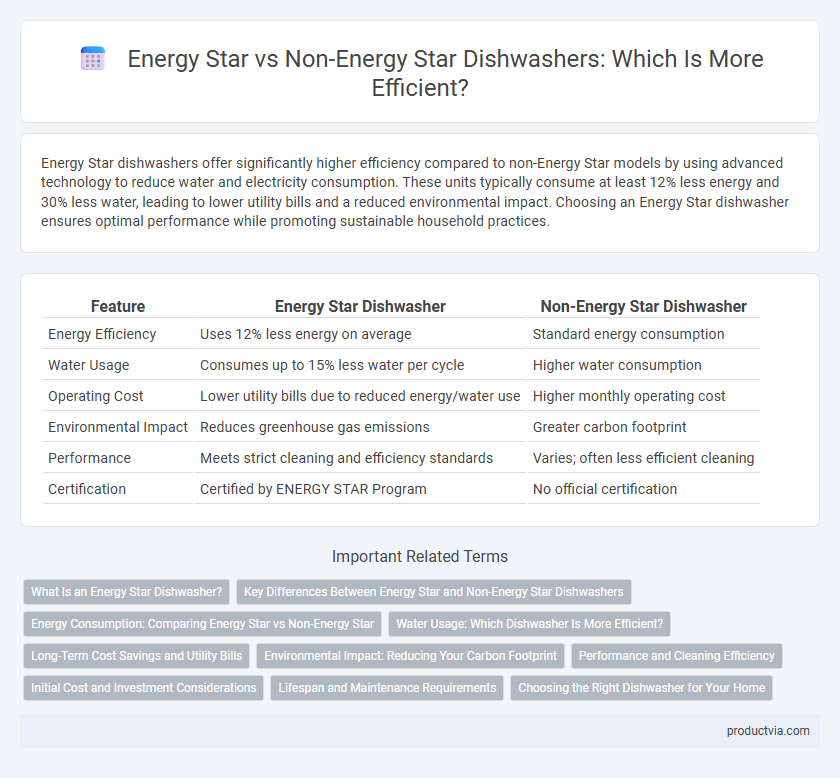Energy Star dishwashers offer significantly higher efficiency compared to non-Energy Star models by using advanced technology to reduce water and electricity consumption. These units typically consume at least 12% less energy and 30% less water, leading to lower utility bills and a reduced environmental impact. Choosing an Energy Star dishwasher ensures optimal performance while promoting sustainable household practices.
Table of Comparison
| Feature | Energy Star Dishwasher | Non-Energy Star Dishwasher |
|---|---|---|
| Energy Efficiency | Uses 12% less energy on average | Standard energy consumption |
| Water Usage | Consumes up to 15% less water per cycle | Higher water consumption |
| Operating Cost | Lower utility bills due to reduced energy/water use | Higher monthly operating cost |
| Environmental Impact | Reduces greenhouse gas emissions | Greater carbon footprint |
| Performance | Meets strict cleaning and efficiency standards | Varies; often less efficient cleaning |
| Certification | Certified by ENERGY STAR Program | No official certification |
What Is an Energy Star Dishwasher?
An Energy Star dishwasher meets strict energy efficiency guidelines set by the U.S. Environmental Protection Agency, reducing water and electricity use compared to non-Energy Star models. These appliances typically use advanced technology such as soil sensors, efficient jets, and better insulation to minimize resource consumption without sacrificing cleaning performance. Choosing an Energy Star dishwasher can lead to significant savings on utility bills while contributing to environmental conservation by lowering greenhouse gas emissions.
Key Differences Between Energy Star and Non-Energy Star Dishwashers
Energy Star dishwashers consume at least 12% less energy and 30% less water compared to non-Energy Star models, significantly reducing utility bills and environmental impact. They incorporate advanced technologies like soil sensors and efficient motors to optimize cleaning performance while minimizing resource use. Non-Energy Star dishwashers typically lack these efficiency features, resulting in higher operational costs and increased water and energy consumption over time.
Energy Consumption: Comparing Energy Star vs Non-Energy Star
Energy Star dishwashers consume approximately 12-25% less energy than non-Energy Star models, translating to lower electricity bills and reduced environmental impact. These appliances use advanced technology to optimize water heating and cycle duration, significantly enhancing energy efficiency. Choosing an Energy Star dishwasher not only ensures compliance with strict energy guidelines but also supports sustainable household energy consumption.
Water Usage: Which Dishwasher Is More Efficient?
Energy Star dishwashers use approximately 3.5 gallons of water per cycle, significantly less than non-Energy Star models that consume around 6 gallons. This reduction in water usage translates to both environmental benefits and lower utility bills. Choosing an Energy Star dishwasher ensures optimal water efficiency without sacrificing cleaning performance.
Long-Term Cost Savings and Utility Bills
Energy Star-certified dishwashers use advanced technology to reduce water and electricity consumption, resulting in significantly lower utility bills over time compared to non-Energy Star models. Despite higher upfront costs, these efficient appliances offer substantial long-term savings by minimizing energy waste and reducing the frequency of repairs or replacements. Consumers benefit from improved efficiency standards that translate into overall lower operational costs throughout the dishwasher's lifespan.
Environmental Impact: Reducing Your Carbon Footprint
Energy Star dishwashers consume up to 12% less energy and 30% less water compared to non-Energy Star models, significantly reducing household greenhouse gas emissions. By using advanced soil sensors and energy-efficient motors, they optimize water and electricity usage, minimizing environmental impact. Choosing an Energy Star dishwasher supports sustainability efforts by lowering carbon footprints and conserving vital natural resources.
Performance and Cleaning Efficiency
Energy Star certified dishwashers deliver superior cleaning efficiency by using advanced sensors and targeted spray jets that optimize water and energy usage while thoroughly removing food residues. Non-Energy Star models often consume more water and electricity, leading to less effective soil removal and longer cycle times. Performance tests consistently show Energy Star dishwashers achieve higher soil removal scores and maintain energy consumption below federal efficiency standards.
Initial Cost and Investment Considerations
Energy Star dishwashers typically have a higher initial cost, ranging from $500 to $1,200, compared to non-Energy Star models, which usually cost between $300 and $700. Investing in an Energy Star dishwasher results in significant energy savings, reducing electricity use by about 12% annually and water consumption by nearly 15%, leading to lower utility bills over time. The higher upfront price is offset by rebates, tax incentives, and long-term cost savings, making Energy Star models a more cost-effective investment despite the initial expense.
Lifespan and Maintenance Requirements
Energy Star-certified dishwashers typically have longer lifespans due to superior build quality and energy-efficient components that reduce wear and tear over time. Non-Energy Star models often require more frequent maintenance as less efficient motors and water systems contribute to increased operational strain. Investing in an Energy Star dishwasher can lead to lower repair costs and extended appliance durability, optimizing both performance and long-term savings.
Choosing the Right Dishwasher for Your Home
Energy Star dishwashers use at least 12% less energy and 30% less water than non-Energy Star models, reducing utility bills and environmental impact. Choosing an Energy Star dishwasher ensures efficient cleaning performance while conserving resources, making it ideal for eco-conscious households. Evaluating the dishwasher's capacity, cycle options, and noise level alongside energy ratings helps select the most suitable model for your home's needs.
Energy Star vs non-Energy Star for dishwasher efficiency Infographic

 productvia.com
productvia.com